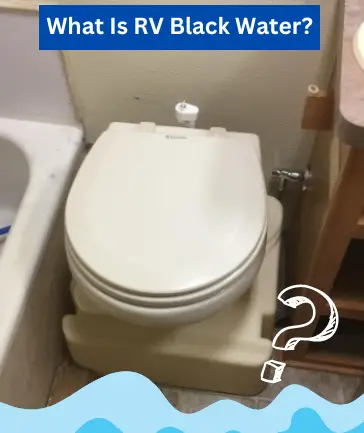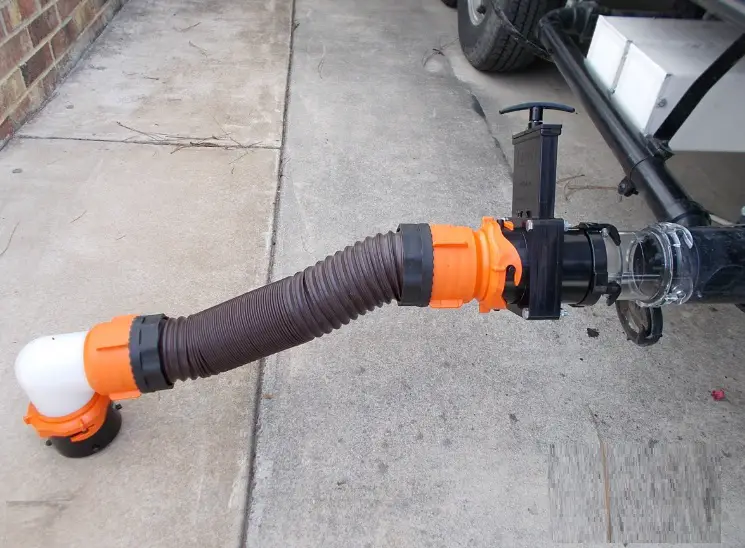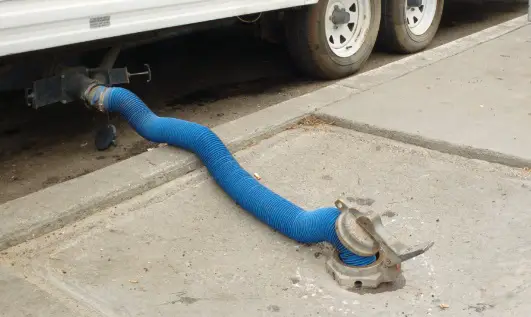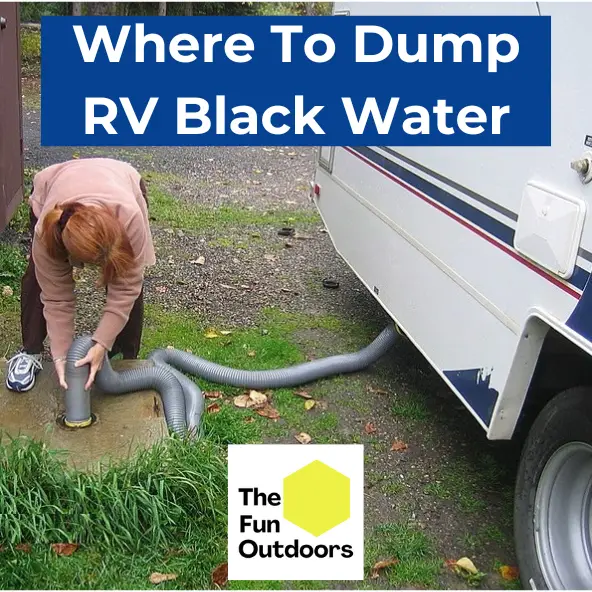Hitting the open road in an RV is an incredible experience. The freedom to explore new landscapes, reconnect with nature, and create lasting memories with family and friends is hard to beat. However, every RV adventure has a less glamorous side: dealing with and disposing of black water. Knowing where to dump RV black water can be a challenge, especially for first-time RV enthusiasts.
Fortunately, there are several locations that provide a safe and convenient means to dispose of RV waste. Knowing where to look and how to properly empty the RV black water tank is essential for a stress-free and enjoyable camping experience.
We’ve put together everything you need to know including safe black water dumping locations and other helpful information in this guide. Read on to learn more.
What Is RV Black Water?

RV black water refers to the wastewater generated from the toilet in a recreational vehicle (RV). This water accumulates in a separate holding tank known as the black water tank. RVs typically have two types of waste tanks – a gray water tank for collecting wastewater from showers and sinks and the black water tank for holding toilet waste.
Unlike gray water, black water contains human waste and is therefore not suitable for discharge without proper treatment. That’s why RV owners must be cautious and responsible with their black water disposal. There are specific places to dump RV black water, such as campgrounds, RV parks, gas stations, rest stops, and approved sewer systems.
Regular maintenance and proper management of the black water tank are essential. Inadequate handling or neglecting the tank can lead to unpleasant odors, holding tank blockages, and potential health hazards. By following the proper dumping procedures and adhering to local laws and regulations, RV owners can ensure that their trips remain enjoyable and eco-friendly.
Understanding RV Black Water Dumping
When it comes to RV living, one of the necessary tasks that every RV owner will have to deal with is dumping their black water tank. Black water refers to the wastewater that comes from toilet use in an RV. It is collected in a designated waste tank called the black water tank. Regularly emptying and maintaining this tank is essential for keeping your RV clean, hygienic, and odor-free.
When it comes to emptying your RV black water tank, follow proper procedures to ensure a clean and efficient process (we cover this in depth later in this article).
While dumping your RV black water is generally done outside the comforts of your home, some individuals with appropriate setups may be able to empty their tanks at home. Connecting your RV waste line to a home’s septic system or using a portable waste disposal unit like a macerator pump can be options in such scenarios.
Finding RV Black Water Dump Stations

When it comes to dumping RV black water, there are several options available for finding convenient dump stations. In this section, we will cover some of the most common places where you can empty your RV’s waste tanks, including RV parks and campgrounds, RV dealerships, gas stations, and city or state dump stations.
RV Parks and Campgrounds
Many RV parks and campgrounds offer dump stations for their guests to empty their waste tanks. Some of these campgrounds may provide this service for free, while others might charge a small fee for using the dump station.
Check the policies of the specific RV park or campground where you are staying or plan to stay to know their rates and regulations.
RV Dealerships
Another option for disposing of RV black water is at RV dealerships. Some dealerships have dump stations available for use, either as a free service or for a nominal fee. Call ahead to check if the dealership near you offers this service and what their fees and hours of operation are.
Gas Stations
Some gas stations, especially those located near highways and popular RV routes, provide dump stations for travelers. Like other locations, these stations may charge a fee for using their dump facilities. Keep in mind that not all gas stations offer this service, so it may require some research and planning to find suitable locations along your route.
City or State Dump Stations
Many cities and states provide designated dump stations for RVs. These facilities may be located at rest stops, truck stops, or even specific sanidumps created for this purpose.
City or state dump stations may be a convenient option depending on your travel route and location. It’s essential to research and plan ahead, as availability, fees, and hours of operation may vary from place to place.
Alternative Dump Location Options

National Parks
Many national parks offer designated RV dump stations for visitors. These locations are convenient for travelers and help to preserve the natural beauty of the park. Always be mindful of park regulations and policies when disposing of black water.
Sporting Goods Stores
You may be surprised to find that some sporting goods stores offer RV dump facilities for their customers. These are typically free to use as a courtesy to their patrons. Always call ahead to ensure availability and check for any possible fees.
Marinas
Marinas are another option for dumping RV black water, as many have facilities designed for managing waste from boats. The infrastructure and services provided by marinas can accommodate the needs of RV owners as well. Just remember to inquire about fees and rules before using the marina’s facilities.
Your Home Septic Tank
If you have a home septic tank, it might be possible to dump your RV’s black water there. However, it’s critical to consult a septic system professional for guidance and to verify if your setup can handle an RV’s holding tanks.
See Related: Is RV Antifreeze Safe for Septic Systems?
Wastewater Treatment Facilities
Some wastewater treatment plants permit RV owners to use their facilities to empty black water tanks. Just ensure to contact them in advance to find out their policies, fees, and any specific requirements.
Recycling Centers
Lastly, some recycling centers also have RV dump stations on-site. While not as common, these facilities are an environmentally-friendly option for disposing of black water waste. Always check their policies and fees beforehand.
Taking the time to explore the variety of alternative dump location options, such as national parks, sporting goods stores, marinas, home septic tanks, wastewater treatment facilities, and recycling centers, will ensure a responsible and convenient disposal of your RV’s black water.
How to Dump RV Black Water
When it’s time to empty the black water tank of an RV, following a few simple steps can make the process easier and more efficient. Remember, it’s essential to dump black water only at designated dump stations or facilities.
First, gather all necessary equipment, such as gloves, sewer hose, and a designated container to catch any spills. It’s better to be extra prepared when dealing with waste from the black water tank.
Start by connecting the sewer hose to the RV’s sewer outlet. Ensure the connection is secure to prevent leaks or spills. Position the other end of the hose into the dump station inlet, making sure it stays in place throughout the process.
Once everything is connected, locate the black water tank valve and slowly open it. Opening the valve too quickly can cause a surge, potentially leading to splashes or spills. Allow the black water to flow out of the tank and into the dump station. When the flow starts to slow down, close the valve.
Next, it’s a good idea to flush the tank with water to ensure all solid waste has been removed. If the RV is equipped with a built-in tank flushing system, connect a water source, such as a garden hose, to the designated inlet and open the valve. If there isn’t a built-in system, simply running water down the toilet or sink can help to rinse the tank.
Once the tank is flushed clean, close the valve, disconnect the sewer hose from the RV, and carefully remove it from the dump station inlet. Be sure to rinse the hose thoroughly before storing it away.
Lastly, always ensure that the area around the dump station is clean and free of debris or spills. This not only helps keep the area sanitary but also makes it more pleasant for the next person who needs to use the dump station. Remember, responsible disposal of RV black water is crucial for maintaining a clean and healthy environment for everyone.
Here’s a great video walkthrough on how to dump your RV’s black tank at a dump station:
See Related: Using Dawn Dish Soap in RV Black Tank
Fees and Legal Aspects
When it comes to dumping RV black water, there are a few things to be aware of concerning fees and legality. First and foremost, it is important to know that it is illegal to dump RV black water on the ground due to its negative impact on the environment and general sanitation1. This means you should never release your RV’s waste into streams or drains either.
Instead, you need to find a designated RV dump station where you can safely and legally dispose of your black water. The cost of using these facilities can vary, but you can generally expect to pay between $10 to $30 for the dump and flush service. Some places might offer free dumping, but they can be harder to find. Usually, the fee will cover refilling your freshwater tanks as well.
To help ensure that you are following the proper legal guidelines, always make sure to use a hose system that connects your black water tank to the dump station’s communal septic tank3. Additionally, it is recommended to only dump your waste when the tank is at least two thirds full, as this helps solid waste properly break down and flow out more easily.
Remember, being responsible and compliant with fees and legal aspects not only contributes to a cleaner environment but also promotes a positive image within the RV community.
Proper Dumping Etiquette and Equipment
When it comes to dumping RV black water, following proper etiquette and using the right equipment can make the process a lot smoother. Start by having necessary items on hand, like disposable gloves, a dedicated RV sewer hose, sewer hose support, and a sanitizing spray. These items will help you stay clean and safe while dumping your wastewater, and they’ll also help prevent any messes or mishaps. Plus, wearing gloves and using sanitizing spray will keep you and other RVers at the dump station healthy.
Before approaching a dump station, make sure you know the difference between gray water and RV black water. Gray water typically comes from sinks and showers, while black water comes from the toilet and holds solid waste. Both types of wastewater should be disposed of properly, with the black water being dumped first, followed by the gray water. Dumping the gray water last helps rinse out the remnants from the black water in your RV sewer hose.
At the dump station, find an approved septic tank or sewer system to dispose of your wastewater. Optional accessories like sewer hose supports can be helpful in maintaining the proper angle to allow gravity to properly drain without spills. Additionally, follow basic RV dump station etiquette by being considerate to other RVers waiting in line, working efficiently, and leaving the area cleaner than you found it.
There are various methods for dumping your RV black water tank, such as the bucket method, which involves using a small container like a bucket to dump the wastewater instead of a hose. While this technique may be useful in some situations, it’s important to have the proper equipment, like a dedicated RV sewer hose, in most cases to ensure a smooth and clean process.
Additional Tips and Resources
Maintaining your tanks involves keeping an eye on tank sensors. These devices help monitor the capacity of your freshwater, gray, and black water tanks. Accurate readings allow for timely disposal and prevent potential plumbing issues in your motorhome.
Frequently Asked Questions
There are multiple ways to find RV dump stations near your location. As asking locals or campground staff can lead you to nearby RV waste disposal facilities. RV-related online forums or social media groups can also provide useful information on dump sites.
Free RV waste disposal options can be available at some public campgrounds, municipal wastewater treatment plants, or rest areas. However, availability may vary depending on the location. Do some research beforehand or ask around to find out if there are any free disposal sites near your camping destination.
If allowed by your city, you can empty your RV black water tank at home by connecting a hose to the sewer cleanout or septic system. Make sure to follow proper safety procedures and sanitize hoses and connections after use.
It is generally advised to wait until the black water tank is at least two-thirds full before emptying it. This allows enough liquid in the tank for solid waste to break down properly, helping to prevent clogs and odors. Waiting too long to empty the tank may cause build-up and could lead to complications during the dumping process.
When boondocking or camping in remote areas without access to a designated dump station, proper waste disposal becomes crucial. One option is using a portable waste tank or “blue boy,” which can be transported to an appropriate dump site. You can also look for nearby campgrounds or rest areas with dump stations and pay a fee for use.

